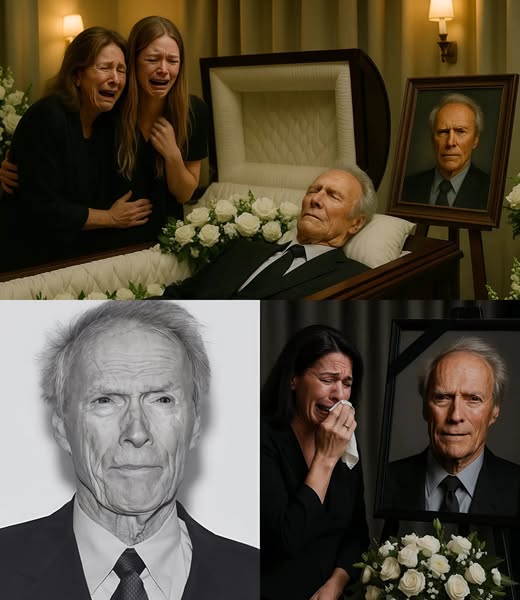Clint Eastwood Remembered: Hollywood Legend Passes Away, Leaving a Lasting Legacy
The world of film and television is in mourning as the family of legendary actor, director, and producer Clint Eastwood confirmed the heartbreaking news of his passing. Known globally for his gritty portrayals of antiheroes, his commanding presence both on-screen and behind the camera, and a career spanning more than six decades, Eastwood leaves behind a remarkable and enduring legacy. His death marks the end of an era, yet his influence on cinema will remain timeless.
From Television Star to Global Icon
Clinton Eastwood Jr., born in San Francisco in 1930, began his journey to fame in the 1950s with minor acting roles. His breakthrough came with the television western Rawhide, a show that introduced him to millions of households across America. However, it was his transition to film that cemented his status as a cultural icon.
In the mid-1960s, director Sergio Leone cast him as the “Man with No Name” in the legendary Dollars Trilogy: A Fistful of Dollars (1964), For a Few Dollars More (1965), and The Good, the Bad and the Ugly (1966). These spaghetti westerns redefined the genre, establishing one of cinema’s most enduring archetypes: the stoic, morally complex gunslinger.
During the 1970s and 1980s, Eastwood further solidified his tough-guy image as Inspector Harry Callahan in the Dirty Harry series. Across five films, Callahan’s relentless pursuit of justice turned him into a symbol of uncompromising masculinity, a figure both celebrated and controversial.
Box Office Triumphs and Career Highlights
While best known for westerns and crime dramas, Eastwood also explored comedy and romance with great success. His adventure comedies Every Which Way but Loose (1978) and its sequel Any Which Way You Can (1980) became box-office hits, demonstrating his versatility. He also shone in classics such as Where Eagles Dare (1968), Escape from Alcatraz (1979), Heartbreak Ridge (1986), In the Line of Fire (1993), and The Bridges of Madison County (1995).
Even in later years, films like Gran Torino (2008), The Mule (2018), and Cry Macho (2021) confirmed that Eastwood’s presence on screen remained magnetic. Notably, nearly all of his American films since 1967 were produced through his own company, Malpaso Productions, giving him rare creative freedom in Hollywood.
Acclaimed Director and Academy Award Winner
Eastwood’s legacy as a director is equally remarkable. He won two Academy Awards for Best Director and two for Best Picture with Unforgiven (1992) and Million Dollar Baby (2004). Unforgiven redefined the western, exploring the cost of violence, while Million Dollar Baby offered a heartbreaking sports drama that earned universal acclaim.
He also directed critically praised films without appearing on screen, including Mystic River (2003) and Letters from Iwo Jima (2006), the latter nominated for Best Picture. His diverse portfolio spans genres—from war dramas (American Sniper, 2014) to historical biopics (Invictus, 2009)—highlighting his ability to tell compelling stories across cinematic landscapes.
A Political Chapter: Mayor of Carmel-by-the-Sea
Beyond Hollywood, Eastwood made his mark in public service. Elected mayor of Carmel-by-the-Sea, California, in 1986, he served two years with the same pragmatic, straightforward style that defined his career. His tenure reflected his dedication to community and no-nonsense approach to leadership.
Honors and Recognition
Throughout his career, Clint Eastwood received numerous accolades, including four Academy Awards, four Golden Globes, three César Awards, and the prestigious AFI Life Achievement Award. In 2000, he received the Golden Lion for Lifetime Achievement at the Venice Film Festival. France honored him with the Legion of Honour (2007) and the Commander of the Ordre des Arts et des Lettres (1994). These awards reflect not only his cinematic influence but also his status as a global cultural icon.
A Timeless Symbol of Hollywood
Eastwood’s image—whether as the nameless gunslinger confronting foes in a dusty western town or the grizzled cop delivering sharp one-liners—remains etched in popular culture. He became more than an actor or director; he was a symbol of rugged independence and perseverance. Balancing mainstream box-office appeal with artistic credibility, Eastwood carved a singular path in an industry often defined by compromise.
Family, Fans, and Tributes
News of Eastwood’s passing prompted tributes from fans, actors, and filmmakers worldwide, all celebrating his artistry, resilience, and influence. His family remembered him not only as a Hollywood legend but also as a devoted father and grandfather whose personal life mattered as much as his professional achievements.
Many in the film industry credit Eastwood with inspiring generations of actors and directors. His work behind the camera demonstrates that Hollywood stars can successfully transition into influential storytellers. Filmmakers today continue to study his movies for lessons in pacing, character development, and narrative depth.
The Legacy of Clint Eastwood
Clint Eastwood’s career defies easy summarization. He was an actor who defined multiple genres, a director who earned critical acclaim, a producer who forged his own path, and a political figure who applied his Hollywood grit to public service. From Leone’s dusty western plains to the emotional landscapes of Million Dollar Baby, his range was extraordinary.
His films asked profound questions about morality, justice, and the human cost of violence while never losing sight of empathy and emotion. This rare combination of toughness and sensitivity ensures his work will continue to resonate for generations.
Conclusion: Farewell to a Hollywood Titan
The confirmation of Clint Eastwood’s death marks the end of a monumental chapter in Hollywood history. Few have achieved the breadth of success and influence that he enjoyed. His characters embodied resilience, independence, and moral complexity, while his direction showcased nuance, compassion, and cinematic mastery.
As fans mourn, they also celebrate a body of work that will endure. Clint Eastwood may be gone, but his spirit lives on through films that shaped cinema and defined masculinity for decades. From Dirty Harry to Unforgiven, Gran Torino to Million Dollar Baby, his career remains nothing short of extraordinary.
